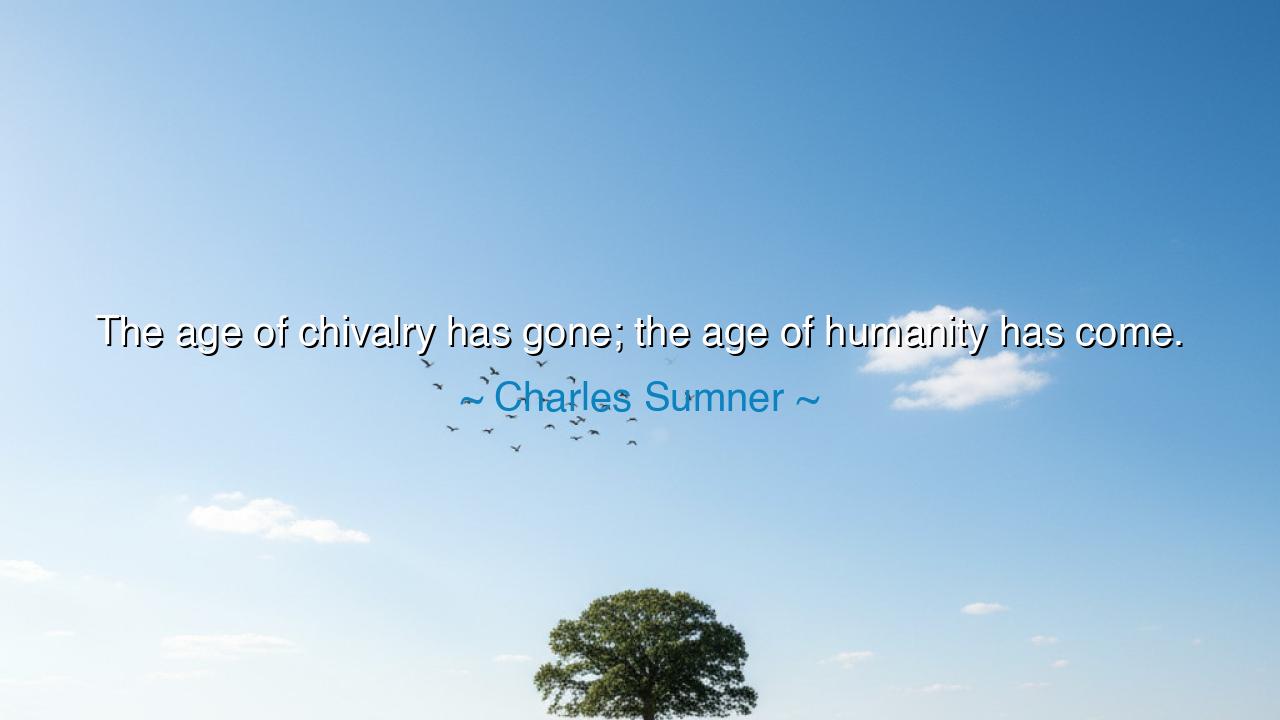
The age of chivalry has gone; the age of humanity has come.






The words of Charles Sumner, noble orator and champion of justice, ring across the corridors of time: “The age of chivalry has gone; the age of humanity has come.” In this declaration, uttered amid the turbulence of the nineteenth century, there is both farewell and prophecy. Sumner, that fearless voice of conscience in the American Senate, was not lamenting the loss of valor, but celebrating the birth of a higher courage — the courage of compassion, equality, and moral reason. His words proclaim the evolution of civilization: from the sword to the soul, from the battlefield to the heart.
In the age of chivalry, men fought for honor and glory, often in the name of kings and faith. Their valor was bright, but it was also narrow — a light cast only upon those deemed worthy by blood or creed. The knight’s code exalted bravery and loyalty, but it did not yet know mercy for all mankind. Sumner, a son of a new age, saw that the world must rise beyond the glitter of arms to embrace a deeper heroism — the heroism of humanity. No longer should courage be confined to the clash of steel, but shown in the defense of the oppressed, in the lifting of the weak, and in the steadfast pursuit of justice through reason and truth.
Sumner spoke these words during an era when America was torn by the agony of slavery. He saw men who still clung to ancient notions of power and dominance, disguising cruelty beneath the banners of tradition. Against them, he raised his voice — not with sword or shield, but with the weapon of moral conviction. In his famous speech, he called for the end of barbaric honor and the dawn of a new ideal: the triumph of human dignity over force. And for this, he paid dearly — beaten nearly to death upon the Senate floor by those who could not bear the light he carried. Yet from his suffering came a deeper truth: that the new knight is not one who conquers others, but one who conquers himself.
This transformation from chivalry to humanity has echoed throughout history. Consider the story of Florence Nightingale, who walked among the wounded soldiers of Crimea, her lamp glowing in the night. Where once knights shed blood, she shed mercy. She too embodied the spirit of Sumner’s vision — the courage to heal instead of to harm, to serve instead of to rule. Her battlefield was not lined with banners, but with beds of the broken; her weapon, not the sword, but the tender hand of compassion. In her, as in Sumner, the age of humanity stood revealed: an era where true greatness is measured not by dominion, but by empathy.
Yet Sumner’s words are not only for his time — they are a call to ours. For though the armor of the knight has rusted, the spirit of cruelty and conquest still lingers in new forms: in greed, in hatred, in the thirst for power. The challenge of humanity is not complete; it demands that each generation choose mercy over might, and principle over pride. To say that “the age of humanity has come” is not to declare a victory, but to command a duty — the duty to make it so.
The lesson is clear and enduring: progress is not the triumph of strength, but the elevation of the soul. True courage lies not in domination, but in understanding; not in vengeance, but in forgiveness. Each act of kindness, each stand for truth, each defense of the voiceless — these are the duels of the modern age. And every man and woman who lives by these virtues becomes, in spirit, the new knight of the world: a defender not of thrones, but of the human heart.
So, let the old banners fall. Let the armors of arrogance and pride be laid aside. Take up instead the shining shield of compassion, the steady sword of reason, and the banner of humanity that bears no crest but the dignity of all souls. For the world no longer needs warriors who fight for glory — it needs guardians who live for love, justice, and truth.
Thus remember, O inheritors of this new age: the time of the knight has passed, but the time of the sage has dawned. The age of chivalry was the age of the sword; the age of humanity is the age of the heart. Be noble not in conquest, but in compassion. For when man learns to see himself in every other, then — and only then — will the true age of humanity begin.






AAdministratorAdministrator
Welcome, honored guests. Please leave a comment, we will respond soon